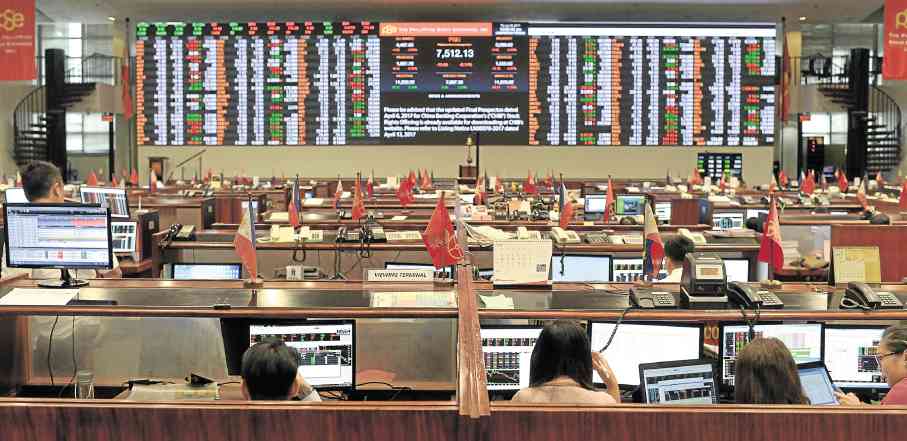
Traders take calls in this file photo of the Philippine Stock Exchange. ELOISA A. LOPEZ
The net inflow of foreign portfolio investment reached a six-week high in the week when President Duterte delivered his report of accomplishments in his first year in office, the latest Bangko Sentral ng Pilipinas (BSP) data showed.
On July 24-28, the $565.17-million, the inflow of hot money exceeded the $345.26-million outflow, resulting in a net inflow of $219.91 million.
Based on BSP data, that week’s net inflow of hot money was the highest since June 19-23’s $211.15 million.
The net inflow in the fourth week of July also reversed the net outflows registered during the second and third weeks of that month.
The inflow that week was higher than the $502.5 million a year ago and $246.18 million a week ago, while the outflow also surpassed last year’s $314.89 million and the previous week’s $261.24 million.
“Two factors likely contributed to the net inflow of foreign portfolio investments during the July 24-28 period: first was the State of the Nation Address [Sona] of President Duterte, and second was the cautious tone of the July 2017 US monetary policy meeting. The speech of President Duterte lifted investor optimism by highlighting the government’s resolve to increase infrastructure spending and implement needed tax reforms,” Land Bank of the Philippines market economist Guian Angelo S. Dumalagan explained.
“Meanwhile, the cautious tone of the Fed spurred bargain hunting, as it supported views of a gradual pace of US interest rate normalization ahead. In particular, the Fed expressed concerns over easing inflation, even as it hinted of a reduction in its balance before the year ends,” Dumalagan added.
Another economist agreed that the net inflow of hot money on July 24-28 may possibly be attributed to the President’s Sona, citing that the Philippine Stock Exchange posted “strong gains” that week.
“The earnings season as well as a dovish Fed statement may have also attracted foreign flows into both the local bond and equity markets,” the economist said.
However, year-to-date foreign portfolio investments remained at a net outflow of $252.98 million, as the $9.716 billion in inflows from January 2 to July 28 were less than the outflows worth $9.969 billion.
In contrast, a net inflow of $1.646 billion was recorded during the same period last year, as the $10.716-billion inflows were more than the $9.069-billion outflows.
In June, the BSP retained its projection of a $900-million net outflow of foreign portfolio investment by end-2017, more than double the net outflow of $404.43 million posted in 2016.
Foreign portfolio investments are in the form of placements in publicly listed shares, government and private sector IOUs, and deposit certificates.
Portfolio investments are considered short-term bets—hence the nickname hot money—because these placements may be pulled out quickly. CBB

